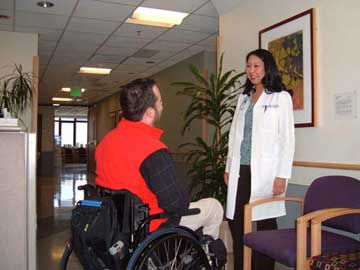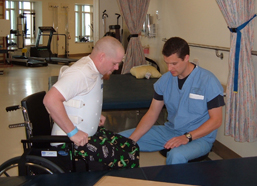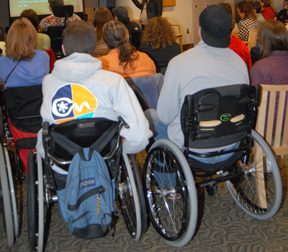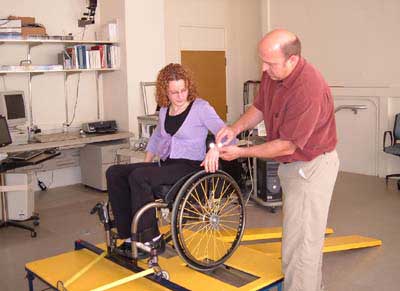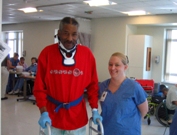Spinal Cord Injury Update
Winter 2007: Volume 16, Number 1
New Grant Funds Model System
The Northwest Regional Spinal Cord Injury System (NWRSCIS) in the UW Department of Rehabilitation Medicine has been awarded a $2.3 million grant from the National Institute on Disability and Rehabilitation Research (NIDRR) to continue for another five years as one of only 14 designated model spinal cord injury (SCI) systems in the country.
Model System grants are awarded to institutions that are national leaders in SCI research and patient care and serve a high volume of SCI patients, providing multidisciplinary care from the point of injury through rehabilitation and follow-up. Each Model System conducts site-specific and collaborative research and contributes data to a national longitudinal study that tracks the long-term consequences of SCI. The NWRSCIS-a designated Model SCI System for 15 years-also disseminates information about SCI to consumers, heath care providers and the general public through its Web site, educational forums, newsletter, brochures and peer mentoring program.
"Our model system grant helps us maintain and try to enhance the care of people with SCI in this corner of the country," says Charles Bombardier, PhD, principal investigator and director of the NWRSCIS (the only SCI Model System west of Colorado ). Bombardier is a clinical psychologist and professor in the UW Department of Rehabilitation Medicine. He co-directed the previous five-year grant with Dr. Diana Cardenas (now chief of rehabilitation medicine at the University of Miami ) and has 17 years' experience in SCI clinical care and research. Co-investigators on the grant are UW rehabilitation medicine physicians Barry Goldstein, Stephen Burns and Peter Esselman, and psychologist Jeanne Hoffman.
Research: Improving Outcomes
The grant funds a new research study called, "Scheduled telephone intervention for individuals with SCI and their families: A randomized controlled trial." This project will examine whether a program of scheduled telephone calls to individuals and their families during the vulnerable first year after injury reduces the medical complications and crises that often lead to emergency clinic visits and rehospitalizations. The study will also measure what effect the intervention has on patient adjustment, mood, community involvement, return to work and quality of life.
"The length of stay (in rehab) following SCI has been getting shorter due to insurance limits, and people are now leaving the hospital sooner than we would wish," Bombardier says. "When they get home, there's lots of adjusting to do." Patients and families are often overwhelmed, dealing with a whole new world of medical care, supplies, equipment, medications, accessibility problems, and a whirlwind of emotions. As one family member recalled, "It's like bringing home a newborn baby-you don't know what to do."
Families are desperate for information, yet previous studies have shown that they rarely initiate calls, even if they are given a 24-hour phone number and told to call anytime. "People don't know what questions to ask," says Jeanne Hoffman, PhD, rehabilitation psychologist and lead investigator on this study. "If they have to make a lot of effort to reach out, it doesn't happen."
Small, unaddressed medical problems can quickly develop into a crisis situation, leading to expensive hospital or emergency visits. "We know that rehospitalizations are higher in the first year (after injury) and so are medical complications," Hoffman adds. Reaching out to families may be one way of averting crises and the costs associated with them.
The study involves randomly assigning newly injured patients (who have agreed to participate) to receive either the telephone intervention program (the treatment group) or the usual follow-up care and services (the control group). Subjects in the treatment group receive regular phone calls from a Research Care Manager who is trained to elicit patient concerns, help people solve problems on their own and connect them with local resources. If needed, the Research Care Manager can access a multidisciplinary team of experts to provide advice and additional referral information. After a year post-discharge, the treatment and control groups will be compared to see how they differ in terms of medical complications, hospitalizations, life satisfaction and other outcomes.
Both Bombardier and Hoffman have worked on similar studies in traumatic brain injury patients, with positive results. "We found that using the telephone in a proactive way, reaching out to people, is a lot more helpful than merely making ourselves available," Bombardier notes. "This intervention doesn't require a lot of time, and it's low cost. We're not using MDs, we're using a social-work-trained person with a backup team of physicians, psychologists, nurses and others."
Ultimately, Bombardier and Hoffman would like to show that this kind of intervention lowers costs by reducing the need for patients to use other, more expensive medical services, thereby encouraging insurance companies to pay for it. "We'd like to change the standard of care, so patients can get more help and have it covered by insurance," Bombardier says.

